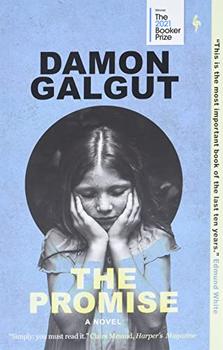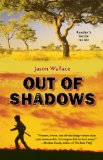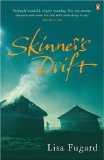Summary | Excerpt | Reviews | Beyond the book | Read-Alikes | Genres & Themes | Author Bio

Damon Galgut's Booker Prize-winning novel, The Promise, opens with a death; Rachel Swart is leaving behind her husband Manie and their three children. As she lays dying, she insists Manie give her long-time maid, Salome, the Lombard place, a ramshackle house on their property in which the servant has lived most of her life. Manie tearfully promises to do so, a pledge witnessed solely by their youngest child, 13-year-old Amor. Later, Manie denies the scene ever occurred, reneging on his oath. The unfulfilled promise remains a sore point for the next 30 years, becoming a topic of debate every time the family is gathered, which only occurs during funerals over the ensuing decades.
Galgut's plot serves as an allegory for post-apartheid South Africa, with the unfulfilled promise from the Swart family, who are white, to Salome, who is Black, mirroring what the author sees as a failed promise of reparations made to the nation's Black citizens. The Swart family's decline parallels that of the country, as corruption and moral failures keep the powerless from obtaining what they're rightfully owed.
Despite the novel's relatively weighty theme, the book doesn't read like its subject is a heavy one; it's only after pondering the subtext that it becomes apparent that its ultimate message is somewhat pessimistic. Indeed, it's actually pretty funny at times, partially due to Galgut's brilliant depiction of the incredibly dysfunctional Swart family, all of whom, apart from Amor, are unlikeable to one degree or another. They engender no sympathy in the reader, making it easier to laugh at their failings.
The truly outstanding feature of this novel, though, is its narrator, who sometimes seems to be omniscient, and at other times feigns ignorance or admits to imagining whole scenes: "Although it's too soon to have [the deed], let's say that she does, let's say the lawyer drew up the document this morning and gave it to her, so there it is, right in front of your eyes, she has the paper in her hand." The voice comes across as conversational — gossipy and critical of the family without explicitly calling them out as the self-centered jerks readers come to know. The narrator tells us:
You might have expected to see [Salome] at the funeral, but [Manie's sister] Tannie Marina told her in no uncertain terms that she would not be allowed to attend. Why not? Ag, don't be stupid. So Salome has gone back to her own house instead, beg your pardon, to the Lombard place, and changed into her church clothes…and like that she sits out in front of her house, sorry, the Lombard place, on a second-hand armchair from which the stuffing is bursting out, and says a prayer for Rachel.
And later, as Salome works through the reception after the funeral:
In the kitchen, Marina supervises the black girl, who has a pile of plates and cups to wash. The way she drags herself around, so heavy and slow, you'd think she's the one who's lost a family member. Unforgivable to be lazy on a big day like this, she has to be pushed along like a boulder, it's exhausting giving orders all the time.
I found it remarkable that Galgut could define his characters so completely through scenes such as this. Writers are often advised to "show, not tell" and this book could be a masterclass in following that dictum.
While the novel contains quite a few conversations, the author chooses to omit quotation marks. Every now and then this practice makes it unclear who is speaking or whether something was said aloud or only thought by a character, but this lack of clarity is the exception rather than the rule. In addition, the narrator seamlessly shifts focus from one character to another, sometimes mid-paragraph, which can also be confusing. I truly enjoyed the author's technique, though, and found that I quickly adapted to his unique style.
The Promise is Galgut's ninth novel and his first to be awarded the Booker Prize, although two previous works were shortlisted for it (2003's The Good Doctor and In a Strange Room in 2010). My opinions don't always coincide with the committee's selections, but in this case I couldn't agree more; The Promise is excellent from start to finish, a consummate masterpiece. I highly recommend it to anyone looking for a great work of literature.
![]() This review
first ran in the February 2, 2022
issue of BookBrowse Recommends.
This review
first ran in the February 2, 2022
issue of BookBrowse Recommends.

If you liked The Promise, try these:

by Jason Wallace
Published 2011
A compelling, thought-provoking novel about race, bullying and the need to belong, set in Africa.

by Lisa Fugard
Published 2006
In this beautiful first novel set in South Africa, Lisa Fugard paints a haunting portrait of a family careering toward disaster, moving with extraordinary agility between intimate and revelatory domestic scenes and the fiercely challenging land.
Your guide toexceptional books
BookBrowse seeks out and recommends the best in contemporary fiction and nonfiction—books that not only engage and entertain but also deepen our understanding of ourselves and the world around us.